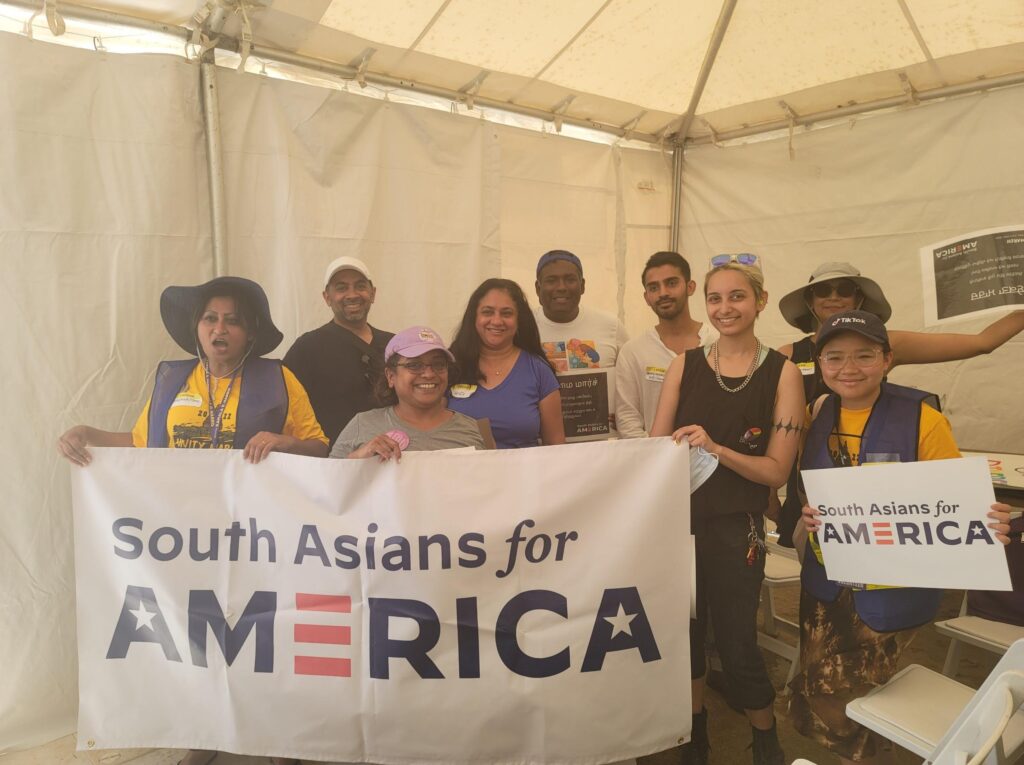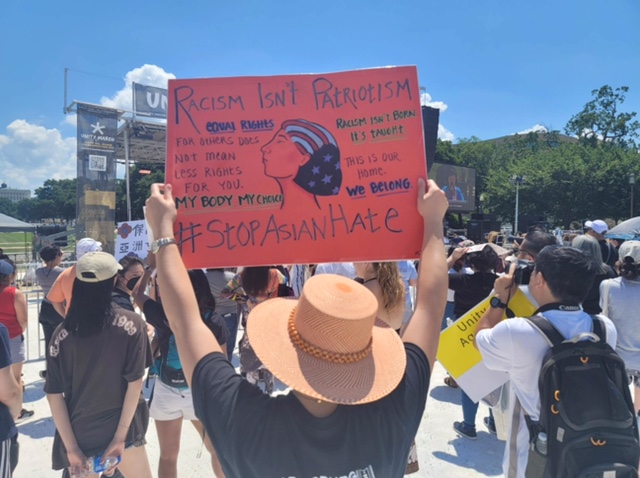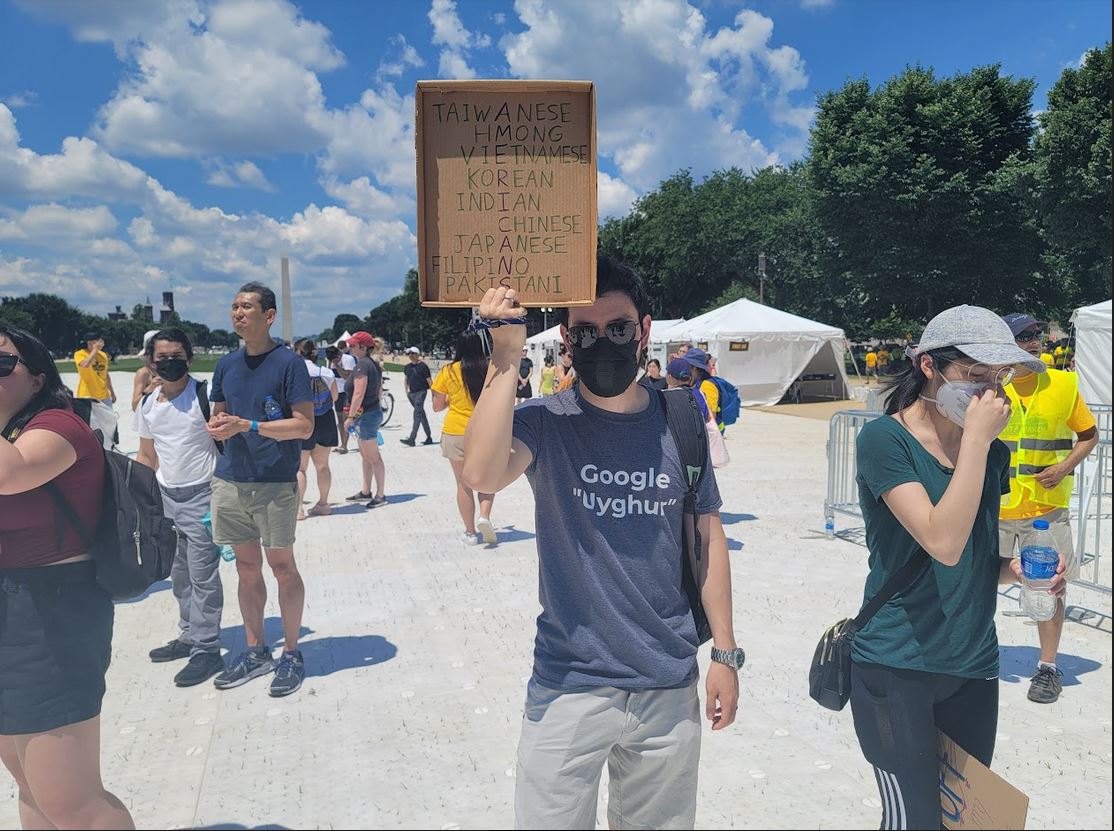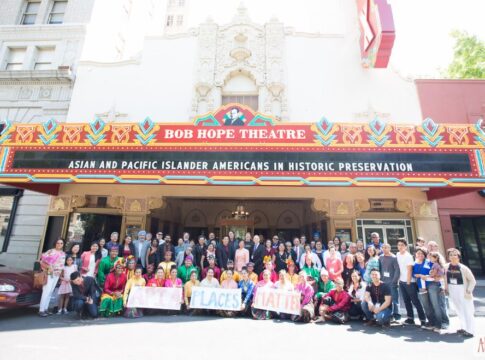By Jessica Xiao, AsAmNews Contributor
WASHINGTON, D.C. – On Saturday, just over forty years since the murder of Vincent Chin, hundreds of people gathered on the National Mall for unity amongst communities of color against racism, in a burgeoning attempt to grapple with AAPI identity in social justice movements and the idea of “unity.”
This AAPI-led march was conceived more than a year ago, after the murders of six Asian women in the Atlanta spa shootings and the mass shooting at a Fedex center in Indianapolis that killed four members of the Sikh community.
Lead organizer Tiffany Chang, director of Community Engagement at Advancing Justice-AAJC and lead organizer, says the need for the coming together of Asian Americans and Pacific Islanders started earlier.
“The need for it really started after George Floyd, if not sooner—after Ferguson—when we really started to see Asian Americans feel a strong conviction to be allies but not know how to answer the question of, where do Asian Americans even fit within the racial, political dialogue?” Chang told AsAmNews in an interview.
LATEST STORIES
Chang noted that some of that identity ambiguity is by design and partly by choice: “a lot of us [AAPIs] we buy into the model minority and are discouraged from rocking the boat. Our erasure is very much part of the narrative and the visibility. That is a result of the false media narratives:”
“This question of how to be allies when we haven’t quite learned how to organize ourselves was compelling to me and something that I think about every single day,” Chang added. “Who are we now? What do we stand for? How have we shown up or not shown up for our allies, for ourselves, for other members of our community? And how do we build that foundation for sustained activism?”
She noted that although AAPIs are still fine-tuning our voice, we must call for unity with other communities of color:
“We can’t create a movement built on a system that itself is built on violence against Asians, communities of color. We need to think past that and won’t be able to sustain that mobilization without a broader commitment to cross racial solidarity, to economic justice, and gender justice in a way more inclusive than we’ve ever seen.”
Another need for unity is to combat the darker “toxic” side to the Stop Asian Hate movement where we see “hypermasculinity” and solutions that do more harm than good.
“We’ve seen folks calling for more policing. Although perpetrators are by-and-large white men, nevertheless, we see backlash against the Black community. There’s been knee jerk reactions to anti-Asian hate that are very anti-Black, very pro-law enforcement, and pro-prosecutorial, incarceral solutions,” Chang said. “This Unity March is really about looking at what resources we have within our community, not just to pursue justice, but to pursue healing, sustainable strength, and political power—we need to welcome folks into a space where we can have that conversation and that’s part of the growing for Asian American communities.”
Additionally, this march marked a more visible coalition-building amongst AAPI community organizations, with more than 60 partner organizations joining. Chang recalls AAPI organizations struggling to absorb the upswell of energy around anti-Asian violence when people were seeking ways to be helpful and in allyship with Asian Americans.

“Quite honestly, there just wasn’t infrastructure. There’s been such a disinvestment/underinvestment in our community organizations so even though there are people suddenly interested in AsAm issues, there’s not really a pipeline or structure to get folks plugged in or to have conversations about what do we do in this moment as a community,” Chang said.
Participants and speakers came from all coasts of the U.S.—from California to New Jersey to Texas, representing the diversity of Asian and Pacific America. Some were featured in an AsAmNews photo story. Prior to the march, APIAVote coordinated bussing in participants from New York, Philadelphia, and adjacent areas to D.C.
Geena Rocero, Tamlyn Tomita, Esther Lee (who spoke with AsAmNews earlier this week), were some of the 35+ speakers at the march yesterday. They spoke on the legacy of AAPI organizing, the modern movement, and next steps for change.
Activist and journalist Helen Zia joined by video message, reminding of the legacy of AAPI solidarity with other communities fighting for social justice.
“For too long our communities have been pitted against each other as if we can only fight for the few crumbs that are thrown our way while white supremacy maintains its grip on power while people of color and people of conscience are the enemy of each other in the struggle for crumbs,” Zia said in her video message.
“As a proud Asian American, as a queer woman of color, as a daughter of immigrants, I was fortunate to grow up at a time in the 1960s when people of color and people of conscience did come together to stand together, to fight together, side by side, on many different issues, but all for the cause of social justice,” she continued.
Zia reminded marcher-goers that unity is possible.
“Unity is not a pipe dream, it is not an unattainable idea,” Zia said, “In the 1980s, at a time of terrible anti-Asian hate, when Vincent Chin was killed, Asian Americans built a united effort against hate, a new Civil Rights movement, with Black Americans, and people from all walks of life, standing together for social justice. As Lily Chin, Vincent’s mother said then, ‘Our skin may be different, but our blood is the same.’”
With the Supreme Court’s decision to overturn Roe v. Wade issued one day before the march, many speakers and signs made reference to the decision.
PICTURES OF MARCH SIGNS REPRO RIGHTS




The Unity March also addressed the Supreme Court decision in a FAQ sheet for the media, calling the overturn of Roe v. Wade “devastating” and citing a May 2022 Pew Research poll that indicated 74 percent of Asian Americans say abortion should be legal in all or most cases.
Lily Trieu, speaker at the march and interim Executive Director of Asian Texans for Justice, shared with AsAmNews how devastating the Court’s decision was, “I’m the child of refugees. It’s surreal that they fled a war-torn country to come and give me a better life, and as a woman now, I have fewer rights than I did when they came here.”

Trieu also expressed the elevated importance for AAPIs to fight for their voting rights, having deep knowledge of the voting restrictions in Texas while it also has the third largest AAPI population in the country. “There’s no online voter registration. People have to fill out physical forms and most places don’t have them available in our languages. Texas heavily restricts voting by mail and restricts the ability of non-English speakers to get help at polling sites. Strict voter ID laws and getting IDs can be a barrier. It is also a heavily gerrymandered state. High-density AAPI communities were split in the process and votes continue to be diluted.”
Regardless, AAPI organizers know that this Unity March is just the beginning of many steps towards it.

John C. Yang, president and executive director of Asian Americans Advancing Justice – AAJC is hopeful. “I am so energized by the new energy and new people in this space. It gives me great hope even as we face challenges,” he told AsAmNews, listing challenges including the Supreme Court’s dismantling of rights, voting restrictions across state legislations, and other issues that restrict AAPI autonomy. “That’s why it is important to march and make our voices heard.”



Anthony Lee wanted to share and make more accessible the deep Chinese values in the artwork that were relatable to other cultures. Like the Mexican ofrenda, the food is an offering to ancestors.
Vincent’s story doesn’t end at being killed, Lee says. It’s about sparking a movement for equity and justice.
AsAmNews is incorporated in the state of California as Asian American Media, Inc and has an application for non-profit 501c3 status with the IRS pending. Check out our Instagram account. Go to our Twitter feed and Facebook page for more content. Please consider interning, joining our staff, or submitting a story, or making a financial contribution. We are committed to the highest ethical standards in journalism. Please report any typos or errors to info at AsAmNews dot com.







